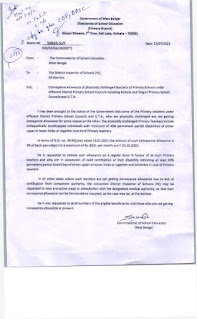The Epidemic Diseases Act, 1897
Every citizen should obey The Epidemic Diseases Act,1897
Be healthy yourself, keep others healthy.
The Epidemic Diseases Act was enacted in 1897 to combat the bubonic plague in British-occupied India in Mumbai . The law is meant to prevent pandemic diseases, to exercise controlling powers, and to control epidemics by special powers.
The Epidemic Diseases Act has been amended to apply to different regions and states.
For example,the Epidemic Diseases (Punjab Amendment) Act, 1944 etc.
The Epidemic Diseases Act has been extended to apply to different regions and states.
For example,Dadra and Nagar Haveli (w.e.f. 1-7-1965) by Reg. 6 of 1963, s. 2 and Sch. etc.
The Epidemic Diseases Act has been regularly used to prevent various diseases of India such as swine flu, cholera, malaria, dengue etc.
Example-
In 2018, The Epidemic Diseases Act was implemented in a region of Gujarat where cholera started to spread.
In 2015, it was used to combat dengue and malaria in Chandigarh.
In 2009, The Epidemic Diseases Act was used to prevent swine flu in Pune.
In March 2020, The Epidemic Diseases Act come ….again…...to limit the spread of coronavirus disease.
As per Section 2 of The Epidemic Diseases Act ,
👉 special powers have been given to the states and regions.States and regions can take special measures to prevent the spread of any kind of disease and may impose necessary rules on public life.
👉 The state government reviewed the situation in view of the outbreak of the deadly disease and found that it would not come by simple rules. Then the State Government may grant any person or institution the right to enforce this particular law.
👉 The government observes any person traveling by rail or any other, if the person is suspected of spreading the disease, then the government will take necessary action and may instruct the person to stay under various rules. The government will arrange for him to be treated separately.In violation of The Epidemic Diseases Act, there is provision for punishment by imposing Article 188 of the Indian Penal Code against that person.
Indian Penal Code(under section 188 of the Indian Penal Code ,45 of 1860)states that in violation of this section, a person is usually subject to a maximum of 1 month imprisonment and a fine of Rs 200 or both. In certain cases a maximum of 6 months imprisonment and a fine of Rs 1000 or both.
No legal action can be taken against the Epidemic Diseases Act enforcement.
Download 👉The Epidemic diseases act 1897 pdf
In Bengali 👇
Download 👉The Epidemic diseases act 1897 pdf
In Bengali 👇
মুম্বাইয়ের ব্রিটিশ-অধিকৃত ভারতে বুবোনিক প্লেগের বিরুদ্ধে লড়াই করার জন্য ১৮৯৭ সালে মহামারী রোগ আইন কার্যকর করা হয়েছিল। আইনটি মহামারীজনিত রোগ প্রতিরোধ, নিয়ন্ত্রণ ক্ষমতা প্রয়োগ এবং বিশেষ ক্ষমতা দ্বারা মহামারী নিয়ন্ত্রণ করতে বোঝানো হয়েছে।
এই আইনটি বিভিন্ন অঞ্চল এবং রাজ্যে প্রয়োগের জন্য সংশোধন করা হয়েছে।
আইনটি বিভিন্ন অঞ্চল এবং রাজ্যে প্রয়োগ করার জন্য বাড়ানো হয়েছে।
এই আইনটি নিয়মিতভাবে ভারতের বিভিন্ন রোগ যেমন সোয়াইন ফ্লু, কলেরা, ম্যালেরিয়া, ডেঙ্গু ইত্যাদি প্রতিরোধে ব্যবহৃত হয়।
2018 সালে, গুজরাটের একটি অঞ্চলে কলেরা ছড়িয়ে পড়তে শুরু করে এই আইন প্রয়োগ করা হয়েছিল।
2015 সালে এটি চণ্ডীগড়ে ডেঙ্গু এবং ম্যালেরিয়া মোকাবেলায় ব্যবহৃত হয়েছিল।
2009 সালে, এটি পুনেতে সোয়াইন ফ্লু প্রতিরোধের জন্য ব্যবহার হয়েছিল।
2020 সালের মার্চ মাসে, এই আইনটি পুরো ভারত জুড়ে প্রয়োগ করা হয়।
2020 সালের মার্চ মাসে, এই আইনটি পুরো ভারত জুড়ে প্রয়োগ করা হয়।
করোন ভাইরাস রোগের প্রসারণ সীমিত করতে।
এই আইনের ২৪ ধারা অনুযায়ী রাজ্য ও অঞ্চলগুলিকে বিশেষ ক্ষমতা দেওয়া হয়েছে। রাজ্য এবং অঞ্চলগুলি কোনও ধরণের রোগের বিস্তার রোধে বিশেষ ব্যবস্থা নিতে পারে এবং জনজীবনে প্রয়োজনীয় বিধিবিধান আরোপ করতে পারে।
রাজ্য সরকার মারাত্মক রোগের প্রাদুর্ভাবের পরিপ্রেক্ষিতে পরিস্থিতি পর্যালোচনা করে দেখেছে যে এটি সাধারণ নিয়মে আসে না। তারপরে রাজ্য সরকার যে কোনও ব্যক্তি বা প্রতিষ্ঠানকে এই বিশেষ আইন প্রয়োগের অধিকার দিতে পারে।
রেল কিংবা অন্য কোনও মাধ্যমে যাত্রা করা কোনও ব্যক্তিকে সরকারের পর্যবেক্ষণ দ্বারা মনে হয়, উক্ত ব্যক্তির কাছ থেকে রোগ ছড়িয়ে পড়ার আশঙ্কা রয়েছে, তাহলে সরকার প্রয়োজনীয় ব্যবস্থা নেবে এবং সেই ব্যক্তিকে বিভিন্ন বিধি নিষেধের থাকার নির্দেশ দিতে পারে। তাঁকে পৃথক রেখে চিকিৎসার ব্যবস্থা করবে সরকার।
এই আইন লঙ্ঘন করে, সেই ব্যক্তির বিরুদ্ধে ভারতীয় দণ্ডবিধির 188 অনুচ্ছেদ চাপিয়ে শাস্তির বিধান রয়েছে।
ভারতীয় দণ্ডবিধির 188 অনুচ্ছেদে বলা হয়েছে যে এই ধারাটি লঙ্ঘন করলে একজন ব্যক্তিকে সাধারণত সর্বোচ্চ 1 মাসের কারাদণ্ড এবং 200 টাকা জরিমানা বা উভয় দণ্ডে দণ্ডিত করা যায়। নির্দিষ্ট ক্ষেত্রে সর্বাধিক 6 মাসের কারাদণ্ড এবং এক হাজার টাকা জরিমানা বা উভয় দণ্ড।
এই আইন প্রয়োগকারীদের বিরুদ্ধে কোনও আইনী ব্যবস্থা নেওয়া যায় না।









Comments